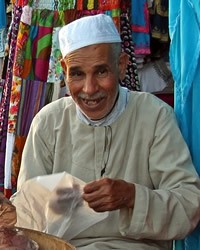Arab, Moroccan in Sweden

Photo Source:
Monica Volpin - Pixabay
|
Send Joshua Project a map of this people group.
|
| People Name: | Arab, Moroccan |
| Country: | Sweden |
| 10/40 Window: | No |
| Population: | 6,000 |
| World Population: | 31,513,800 |
| Primary Language: | Arabic, Moroccan |
| Primary Religion: | Islam |
| Christian Adherents: | 0.09 % |
| Evangelicals: | 0.00 % |
| Scripture: | New Testament |
| Ministry Resources: | Yes |
| Jesus Film: | Yes |
| Audio Recordings: | Yes |
| People Cluster: | Arab, Maghreb |
| Affinity Bloc: | Arab World |
| Progress Level: |
|
Introduction / History
Arabs represent the largest, most diverse, and most politically influential Muslim ethnic grouping in the world. While there are several characteristics that determine if a person is a true Arab, one trait is always evident: a proud sense of being an Arab. The early Islamic period was a time when "Arab identity" meant that all Arabs had descended from a common male ancestor. Thus, being an Arab brought recognition, honor and certain privileges. Their physical, geographical and religious aspects all vary greatly. However, the ability to speak Arabic (or an Arabic dialect) and identification with the Arabian cultural heritage are, perhaps, the two most essential elements. Arabs are the majority people in many countries in the Arabian Peninsula, the Maghreb, and all of North Africa. From there, Arab and Berber armies turned northward, and conquered the Iberian Peninsula (i.e., Spain and Portugal), and held all or part of it till 1492. Arabs were not as much of a threat to northern European countries like Belgium, the Netherlands, Norway, Sweden, and Germany.
Moroccans have been migrating to Sweden since the early 1960s, a time when they were able to find jobs in the service industry: cleaning, driving, construction, etc.
What Are Their Lives Like?
Today Moroccan Arabs have come to Sweden seeking educational and job opportunities and a better life than they had in Morocco. Sadly, there is a high percentage of street children and youths in Sweden from Morocco. Moroccan children in Sweden often do not get the education they need, which makes it very difficult for them to find adequate work. Moroccans are often deported from Sweden because they are not there seeking asylum, since Morocco has a stable government. Moroccan youths often blend in with Sweden's postmodern culture, but they are not likely to turn away from Islam, a big part of their identity. Moroccans have made their mark on Swedish society through the arts and sports.
What Are Their Beliefs?
While Moroccan Arabs prize their Muslim identity, living in a secularized Swedish culture challenges their commitment. To maintain their faith, they immerse themselves in Muslim activities and stay clear of the Swedish culture around them. Those who want to fit in with European culture probably become more secularized. It is hard to imagine where the Moroccan Arabs will be spiritually in a generation or two. Most likely, they will retain their identity with Islam, but it will not affect their lives like it did in Morocco.
What Are Their Needs?
People who genuinely follow Christ will need to patiently and lovingly take the opportunity to take Christ to the Moroccan Arabs in Sweden. They can do this in part by helping to teach language and work skills.
Prayer Points
Pray that God will raise up faithful intercessors who will stand in the gap for Moroccan Arabs in Sweden. Pray that the softening of their traditional culture will soften their hearts so they will hunger for the truth and eagerly accept it when they hear it. Pray for a church planting movement among Moroccan Arabic speaking people in Sweden that will show others the transforming power of the gospel in their lives. Ask the Lord to raise up strong local churches and discipleship movements among Diaspora Arabs in Sweden.